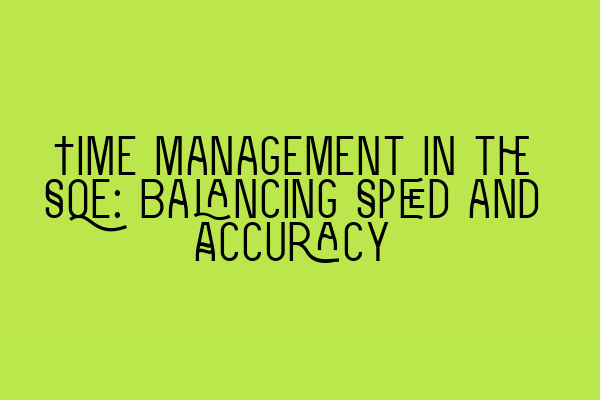Time Management in the SQE: Balancing Speed and Accuracy
As a solicitor in training, mastering time management is essential for success in the Solicitors Qualifying Examination (SQE). The SQE is a rigorous exam that assesses your knowledge and skills across multiple areas of law. To perform well, you must strike a delicate balance between speed and accuracy. In this article, we will explore effective time management strategies to help you optimize your performance in the SQE.
The Importance of Time Management in the SQE
Time management is crucial in the SQE for several reasons. Firstly, the SQE is a time-pressured exam, with a fixed amount of time allocated for each section. Poor time management can lead to rushing through questions, resulting in careless mistakes and lower scores. Secondly, efficient time management allows you to cover all the necessary topics within the given time constraints, ensuring comprehensive coverage of the exam material. Lastly, effective time management reduces stress and boosts confidence, allowing you to perform at your best.
Key Strategies for Balancing Speed and Accuracy
1. Create a Study Schedule: Plan your study time effectively by creating a schedule that allocates sufficient time to each topic. Stick to the schedule and set specific goals for each study session. This will help you stay organized and avoid last-minute cramming.
2. Practice Time-Based Mock Tests: Familiarize yourself with the time constraints of the SQE by regularly practicing timed mock tests. This will help you develop a sense of pacing and identify areas where you need to improve your speed without compromising accuracy.
3. Prioritize High-Yield Topics: Identify the core concepts and topics that are likely to appear frequently in the exam. Allocate more study time to these areas and ensure you have a solid understanding of the underlying principles. This will allow you to answer related questions more efficiently during the exam.
4. Develop Quick Problem-Solving Techniques: In the SQE, you may encounter complex legal scenarios that require careful analysis. Hone your problem-solving skills by practicing strategies such as issue spotting, rule application, and counterargument development. With practice, you’ll be able to navigate through the questions more swiftly without sacrificing accuracy.
5. Utilize Effective Note-Taking Methods: During your study sessions, develop a system for taking concise and organized notes. This will save you time when reviewing the material later and help you quickly locate relevant information during the exam. Experiment with different note-taking techniques, such as mind maps or bullet point summaries, to find what works best for you.
Integrating Speed and Accuracy on Exam Day
On the day of the SQE, it’s crucial to have a clear plan in place to maximize your performance. Here are some tips to help you integrate speed and accuracy effectively:
1. Read the Instructions Carefully: Before diving into the questions, take a few minutes to thoroughly read the instructions. Understanding what is expected of you will prevent unnecessary errors caused by misinterpretation.
2. Skim the Questions: Quickly go through all the questions to get an overview of what lies ahead. Identify any questions that you feel confident about and start with those to boost your confidence and save time for more challenging ones.
3. Manage Your Time: Divide the total available time equally among the questions. Stick to this time allocation, but be prepared to adapt if you encounter particularly difficult questions. Remember, it’s better to allocate extra time to complex questions than to rush through and provide incorrect answers.
4. Answer Strategically: Focus on providing the most important information and arguments when answering the questions. Be concise, yet thorough, to save time without compromising on accuracy.
5. Review and Proofread: If time permits, do a quick review of your answers. Look for any potential errors or areas where you can provide additional clarification. However, be mindful not to spend excessive time on reviewing, as it may eat into your overall exam time.
By implementing these strategies, you can strike a balance between speed and accuracy in the SQE, increasing your chances of achieving a high score and successfully qualifying as a solicitor.
Further Resources for SQE Preparation
For more in-depth guidance on specific legal topics related to the SQE, we recommend reading the following articles:
- Legal Considerations in Residential Leases: Essential Insights for Solicitors
- Lease Laws in the UK: Unraveling the Legal Framework for Tenants
- Workshops on Land Law: Hands-On Training for Effective Practice
- Differences Between Commercial and Residential Property Laws: Examining Contrasting Regulations
- Interactive SQE Mock Tests for Property: Enhance Your Exam Performance
These articles provide valuable insights and resources to supplement your SQE preparation, ensuring a comprehensive and well-rounded understanding of property law.
In conclusion, mastering time management is essential for achieving success in the SQE. By effectively balancing speed and accuracy, following a structured study plan, and utilizing strategic exam techniques, you can optimize your performance and increase your chances of qualifying as a solicitor.

Leave a Reply